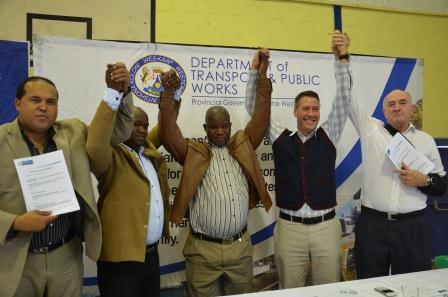
News
Province and City to Legalise and Regulate Amaphela Operations
Amaphela sedans have been providing a taxi-type operation in areas where a gap in the public transport market had existed. The services dates back to the late 1970s and early 1980s and catered for the overall mobility needs of less affluent communities.
In the past, the poor state of the Amaphela industry characterised by a lack of proper regulation and self-regulation, has resulted in:
- Poor vehicle quality with vehicles failing to meet the required standards.
- Passenger safety being compromised by fleets of old, defective vehicles.
- Illegal operations resulting in overtrading and related violent confrontations.
“In the past, authorities have opted to turn a blind eye to the Amaphela operation resulting in the lack of regulation and the growth in the number of illegal operators. This has become an untenable situation as the increased operations have resulted in tensions with mini-bus taxi operators.
“The intervention of the Office of the Registrar saw CATA (Cape Amalgamated Taxi Associations) and the Amaphela leadership meet and agree that there is an urgent need for the regulation of Amaphela operations in order to ease tensions,” said Minister Carlisle.
Regulation of the Amaphela operations will include:
- The registration of Amaphelas.
- The issuing of operating licences commensurate to passenger demand.
- Drafting of a Code of Conduct.
- Assistance with the adoption of a Constitution (in cases where associations are registered) and ensuring that such constitutions are consistent with the Standard Constitution.
“The Department of Transport and Public Works, municipalities and law enforcement agencies will also work together to effectively plan and regulate Amaphela operations to ensure that they are no longer synonymous with crime in areas where they operate.
“These vehicles have been known to be often used during robberies and kidnappings in the metro-southeast part of Cape Town. Non-compliance and contravention of the agreements for operation will not be tolerated, as is the case with other forms of public transport,” added Minister Carlisle.
Phase 1 of this project to legalise and regulate the Amaphela operations operating in the City of Cape Town, saw the first 100 decision letters handed over to the successful applicants at an official ceremony at the Gugulethu Sports Complex.
Two bodies have registered with the Provincial Regulating Entity (PRE) under CATA, namely Kiki Murray North and South. Operators will now have 60 days to lift their operating permits by submitting the necessary documentation to the Office of the Registrar, allowing them to operate.
Vehicles manufactured after the year 2000 may not be registered.
“The effective regulation of the Amaphela service will aid in the successful implementation of integrated public transport networks in the Province, and is in line with PSO3, which aims to increase access to safe and reliable transport. We hope to create a harmonious and mutually respectful relationship between the Amaphela operators, Provincial Regulating Entity (PRE), municipalities and various other role-players in the industry. We hope to see a better Amaphela industry that will provide a safe and reliable service to the many that use it and for this service to be expanded to other parts of the Province.
“I would like to assure the Amaphela industry that their rights will not be taken away, but can be lost should they not operate within the law. Unsafe vehicles belong in the pound, and over time, the unsafe Amaphela vehicles will also be impounded.
“We will continue to ensure that all vehicles transporting passengers operate legally and within the set requirements,” added Minister Carlisle.
Siphesihle Dube
Media Liaison Officer
Ministry of Transport and Public Works
Tel: 021 483 8954
Cell: 084 233 3811
E-mail: Siphesihle.Dube@westerncape.gov.za


